Friday, 24 November 2023
Organic and fair is going mainstream, and you will have to go a long way to find a big food retailer not stocking at least some appropriately labelled items. As long as you avoid the cheapest textile retailers you will also be able to needle-pick organic cotton fig leaves covering up for otherwise not exactly fair, social and environmentally conscious behaviour in many fashion outlets.
So even if you happen to be stranded in darkest suburbia, you will be able to survive somehow. In the Munich metropolitan area however, you have the choice of leaving your money at retailers more conscious than average. Some of them are local chains, others have outlets or franchise takers everywhere in Germany and sometimes even abroad.
Food and necessities
There's a wide range of organic full retailers as well as smaller organic supermarkets, so chances are good that you will find one in your vicinity. Most malls however, with their exchangeable shops and brands, stick to conventional supermarkets, and – here's your choice – a smaller health-food store (Reformhaus), often of the Vitalia chain. Larger and newer branches even offer a coffee or snack bar. Although some stores are up to 80 percent organic, check for organic labels, as up to half of their goods on sale may be conventional.
The DM Drogeriemarkt drugstore chain is being managed according to anthroposophical principles in such a successful manner that new branches have been popping up in almost every newly or re-opened shopping complex during the past years. It has always had a focus on organic and eco-friendly products (alongside the conventional stuff) and is most certainly the reason for that its competitors Müller and Rossmann now also stock a wide range of organic dry food products, sweets and drinks, as well as natural cosmetics. While the big Müller branches stock an impressive selection of natural cosmetics brands and recently stepped in for DM as a reseller of the Alnatura food brand, DM has a broader focus, with a series of eco-friendly household items such as nappies, detergents, dishwasher tabs, or organic cotton pads of the "nature" own-brand alongside the own-brands "DM Bio" (food), and "Alverde" (cosmetics and toiletries). In addition DM branches sell a growing selection of reputable organic and eco cosmetics brands, such as "Weleda", "Lavera", "Sante", "I+M Berlin", "Dr. Bronner" (all products fully natural) or "Eos organic", "Dresdner Essence" and "Kneipp" (watch out for eco labels). Products of the "Alnavit" brand for nutrition and allergene avoiding food and sweets are usually organic, as are the own brand of the vegan supermarket chain Veganz. Since they kicked out Alnatura as their exclusive organic food brand a variety of products by various organic producers has been showing up in the shelves. For detergents stick to products of the "Ecover" and "You" brands. Also a word of warning towards the nature washing detergent: It's labelled with the Blue Angel environmental label, but nonetheless contains synthetic perfumes which accumulate in your clothes.
Thus said: Fresh food aside you will find everything you need for a daily eco-conscious lifestyle. It should however not go unnoticed that DM own brands comply with minimum standards for organic food and natural bodycare only. Food products complying with higher organic standards such as the biodynamic corn products by Alnatura were replaced when the chain rearranged their product selection. DM is said to treat its employees fairly, though this may of course vary with the branch management. And if you are not satisfied with a product (like I was with the washing liquid) or simply bought the wrong one they guarantee that you may return it in any chain store, opened or sealed, even without receipt. I did it, and it always worked like a charm.
If you for various reasons do not like dedicated organic supermarkets but find the search for sustainable and eco-friendly products in conventional supermarkets tedious pay a visit to the shops of the Fulda-based supermarket chain Tegut. The company took over the insolvent Basic supermarkets and converted most branches to predominantly conventional shops.
Lunch, snacks and coffee
The remaining branches of the Basic brand have a self-service coffee and lunch bar, but the entrance area of a supermarket might not be the place for a read or chat while having a coffee.
Munich also has a few branches of the coffee house franchise Black Bean serving exclusively organic coffee. Unfortunately only the coffee itself (and some soft drinks) are organic – no organic milk or pastries. However, since the Maxvorstand branch closed spring 2020 I am not aware of the status of the second branch in Schwabing. Black Bean branches offer free wifi.
Another Munich-based coffee chain franchise has been growing with new openings even during the covid pandemic: Coffee Fellows offer their coffee drinks both, in creamware, returnable Recup coffee cups.
The chai latte is fully organic as is all the milk and if you watch out for the "bio" label you will also be able to have an organic softdrink, unfortunately from one-way plastic bottles.
This chain has been expanding a lot recently and you will find them preferably in the vicinity of transportation hot spots like train stations, airports, fuel stations and shopping malls.
Interestingly one of the major bakery chains in Munich is an organic one: Hofpfisterei branches will usually sell you organic sandwiches (made of typically German sourdough bread) or pretzl with butter ("Butterbrezn" is not just a children's favourite), but on less frequented locations they may be outsold by early afternoon. In this case you can still buy organic spread (cheese or vegetarian) or sausages along with your breadrolls or opt for a sweet pastry. Most shops offer organic coffee-to-go, mineral water and softdrinks, and the bigger ones usually have a bar table or two. Both, the Hauptbahnhof and the Ostbahnhof train stations have a Hofpfisterei branch, although the latter one is closed on Sundays. An hour before closing Hofpfisterei offers a discount on breads, breadrolls and pastries, and many branches cater for the early bird, often opening at 7am.
For hearty Mexican fast food head for one of the Pureburrito branches.
Clothes
Both, the C&A and H&M fast fashion chains have been extending their range of products made from organic cotton, recycled and eco-friendlier materials in the past years. C&A shops label their sustainable collection clearly visible on the price tag (look out for small hearts and the "Bio Cotton" string), but the product range is restricted to basic items such as t-shirts and underwear, and apart from this unreliable. Kids and teens are better catered for than adults.
Since they are only randomly presented together you may find yourself fine-reading labels.
H&M covers a broader range of sustainable products – you will even find the occasional dress for women. But since most of them are made of mixed garments containing not biodegradable plastic fibres and there's no cradle-to-cradle concept they are just better than nothing. Products of the "H&M conscious" brand can be distinguished by their green tag. They are presented together in separate areas, both, within the women, kids, and men stores, and hence easy to find. According to Greenpeace both companies had been taking serious measures to reduce hazardous chemicals in the production process and to introduce fairer production during the 2010ies.
Closed
2023-11-24 22:00:00
[Munich, Schwabing, supermarkets, coffee, snacks, lunch, bakeries, grocery, fashion, bodycare, household, covid, corona]
Link

Thursday, 20 July 2023
Bavarian opening hour regulations are far from liberal, hence your shopping options on Sundays and after 8 pm are limited to, uhmmm, petrol stations, more or less. Not the kind of place you'll expect to find organic food, toiletries or other necessities in eco-conscious quality.
But the times, they are changing, and for the organic Munich traveller or inhabitant, there's no reason to despair anymore. Your best bet are railway stations, namely Hauptbahnhof (main station) and Ostbahnhof.
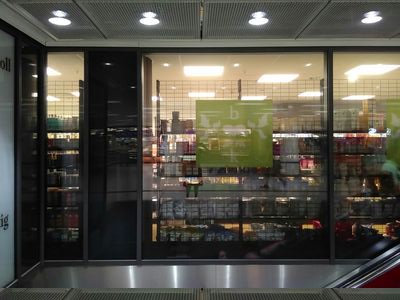
At the Hauptbahnhof enter the basement from Elisenhof in Western direction, following the S-Bahn signs (if you come from the trains head straight ahead to the Eastern exit to enter the basement). Opposite the entry to S-Bahn (urban trains) you'll find Biokultur, a full-fledged organic supermarket. It's your only choice for fresh organic fruit and veges on Sundays and offers everything you'll expect from a full retailer (including wine, household cleaning items, toiletries, ...) as well as a pleasant shopping atmosphere. Before the covid-19 pandemics, this organic supermarket kept open after 8 pm, but shortage of staff applies here as well, so in 2023 the shop still keeps open on Sundays, but without extended opening hours.
There's a second branch in the neighbourhood of Riem, without a permit to keep open on Sundays.
Next to the Biokultur at Hauptbahnhof you'll find a branch of the local organic Hofpfisterei bakery chain, the only one open on Sundays. As all of their branches it also stocks a small range of organic drinks, dry and dairy products as well as organic cold cuts. On weekdays they offer a selection of yummy organic sandwiches to take with you,
both, vegetarian and omnivore, most of them with gorgeous German sourdough bread – perfect provisions for train travellers. On weekends only buttered prezls ("Butterbrezn") are available for take out.
Unfortunately the Hofpfisterei branch at Ostbahnhof train station does no longer keep open on Sunday mornings, but a five minutes brisk walk from the station you'll find one of those family-owned bakeries that are becoming so rare these days. Leave the station at Orleansplatz exit, cross the square and follow the tram tracks along Wörthstraße. At the end of Bordeauxplatz square, corner Metzstraße, you'll find Cafe Reichshof run by the Neulinger family, a lovely coffeehouse cum pastry shop. Treat yourself with their delicious organic cakes, icecream or a savory organic snack like the traditional Bavarian Weißwurst (sausage) breakfast. If you don't feel intrigued to stay shop from a huge range of organic bread, rolls, and cakes. You can also buy a small selection of prepackaged cheese and meat cuts, butter, milk and jams from the fridge opposite the coffee machine.
Starting in 2022, the other Neulinger branches in Neuhausen, the meat-packing district of Ludwigsvorstadt and the wholesale market area in Sendling have been keeping open on Sundays and public holidays, too, though some only for breakfast.
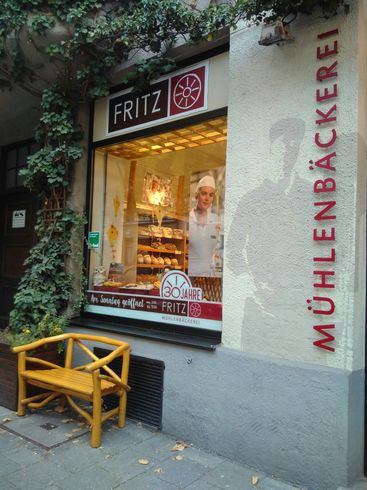
Everything you need for a sumptious breakfast or cold snack (except fresh fruit and veges) can be bought from Fritz Mühlenbäckerei near Rosenheimer Platz. Between 1987 and 2010 this cosy artisanal baker's shop was the headquarter of one of Munich's eldest organic bakeries. Now the scent of warm bread fresh from the oven is gone – all the production takes place in modern facilities in the outskirts of Aying. The shop however is still here and open on Sunday mornings, including a small grocery section equipped with a large fridge.
About ten years after the Fritz bakery moved their bakery from the Haidhausen backyard to Aying the bakers came back to town with a bread bakery in Glockenbachviertel. The former cafe re-opened in June 2020 – buy your daily artisanal bread and watch the bakers at work.
If you happen to be in Grünwald on a Sunday morning (or another day of the week during working hours) make sure to buy the best German sourdough bread in the entire Munich area from Lokalbäckerei Brotzeit. Their bread workshop is located on the premises of the Alter Wirt hotel, with a separate entrance and a small lunch cum cafe counter where you can choose a roll and from a range of all organic spreads, coldmeat, cheeses and more to get your customised sandwich.
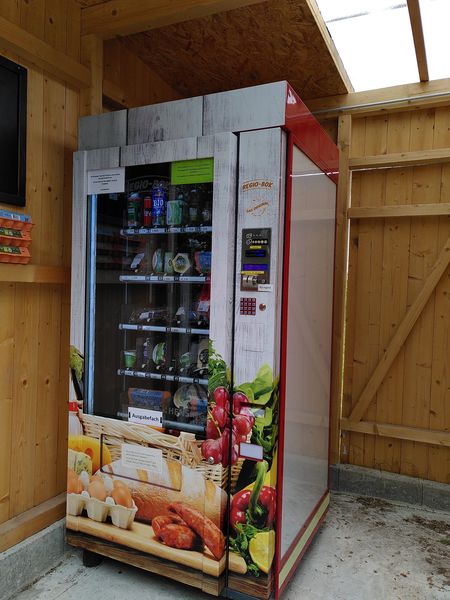
Back at Ostbahnhof trainstation, directly at the southern exit of the U-Bahn station into the Ostbahnhof building you'll find the place that will save your life after 8pm: This branch of the DM-Drogeriemarkt chain does not only stock the usual excellent range of natural bodycare, organic dry products, vegan alternatives and eco-friendly household helpers, but boosts a capable selection of dairy products, eggs and even a freezer stocked with organic pizza, berries, icecream, ... Unfortunately – and unlike other DM branches – organic choices and certified natural cosmetics aren't clearly marked on the shelves, so watch out for organic and natural cosmetics labels, and brands.
Vending machines
A few steps from the urban train stop Johanneskirchen, directly located at the bus stop "Johanneskirchen Bhf" there's an 24x7 open vending machine selling Bavarian produce: Not everything from the so-called Regiomat is organic, but you can buy organic eggs, UHT milk, cheese, chocolate pudding, cream and ready-made tomato sauce.
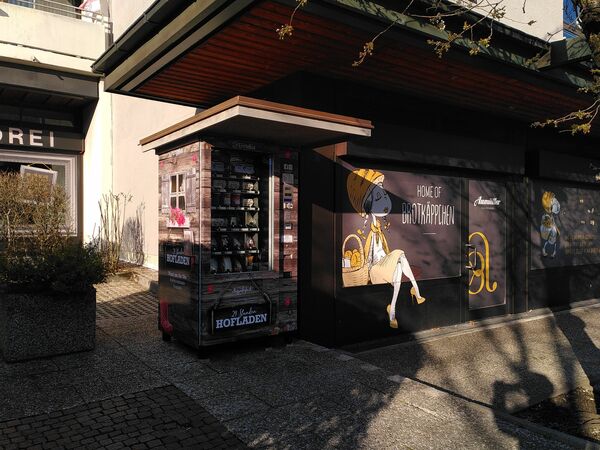
By the summer 2020 the concept of vending machines for products of smaller local farms finally had made it into Munich town, too: The Erntebox vending machines offer eggs and chicken meat, sausages, cheese, pasta and fruit jam, not everything organic, but most likely from farmers around Munich with a focus on sustainability. There's one at the Grünspitz in Giesing, a hotspot for urban agricultural and greening projects, and another at busy Berg-am-Laim-Straße in the Eastern neighbourhood of Baumkirchen. To find the latter isn't easy: Follow the shop windows of the (conventional) Aumüller bakery in in city (Western) direction and stop when the house turns at an angle. Unfortunately the number of certified organic products has been decreasing here: When I re-checked in summer 2023, the organic sausages were gone, but there's again a good selection of organic cheeses.
2023-07-20 22:00:00
[Munich, Gruenwald, Johanneskirchen, Haidhausen, Sendling, organic, coffee, gifts, snacks, lunch, breakfast, bakeries, grocery, supermarkets, trainstation, Regiomat, covid, corona]
Link

Sunday, 23 October 2022
Many years ago I noticed a sign post in Munich: This way to Venice on bike.
Since then the idea has been developing, and this summer I had almost sufficient time off to get on the road from
Munich to Venice.
Almost: To cross the Alps and the Dolomites comfortably, in style and on the same motorless bike used in daily city traffic five days
are not enough. In addition, the weather forecast for my first day off announced heavy rains on the way from Munich.
So we decided on a lazy start with a local train to Lengries in the afternoon. Starting off in perfect bicycle weather, we were soon caught by pouring rain. It turned out that
on the German side, the bridge over the Walchen river was the only shelter
on the route. The route itself followed a pattern common for all Bavarian bikeroutes I have taken so far: straight paved road for
cars, much up and down and lots of gravel on the bikeroute. The reward: Breathtaking
views over both, the Sylvensteinspeicher dam and the Walchen river.
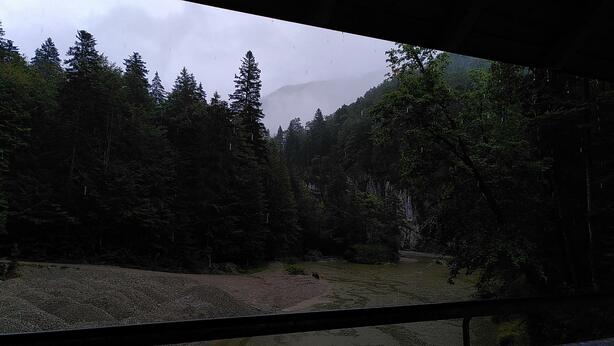
After the Austrian border cyclists are taken better care of:
Most of the time the signposts guided us on separate or
low-traffic ways, all paved. No need for a map or a GPS so far, all the way
to Jenbach.
When we approached picturesque lake Achensee the rain had ceased but the sun already started to set. So there was no time to stop for an organic farmers' ice-cream ("Biobauernhofeis") at Seestraße, to the left of the gate to the public bathing beach at the Northern part of the lake and marvel its deserted beauty after the rain. So I'm really sorry I did not stop to map the ice-cream kiosk on OSM! A little further South I also noticed a shop advertising locally produced natural bodycare and organic herbs: Kräuterhüttl. Obviously, this is tourist land.
Instead we pedalled fast to reach a late urban train from Jenbach to
Innsbruck where we arrived late.
The twisting road downhill to Jenbach is steep – cyclists in Jenbach must be fit! In the dark and even though there was little car traffic at that time of the day it wasn't the fun it otherwise could have been. From Jenbach the urban trains S4 and S5 run by S-Bahn Tirol give cyclists a welcome and reliable shortcut all the way uphill to Innsbruck.
Brenner Pass and Puster Valley: Innsbruck–Terenten/Terento by train and bike
Given our tight time budget we decided to continue lazily the second day:
The urban train S3 from Innsbruck to Brenner/Brennero
is a comfortable shortcut for the tedious (and ugly) way uphill trusted by cyclists (not only lazy us). At the once nice border station between Austria and the Italian province of South Tyrol we waved good-bye to the ugly motorway E45 crowded with equally ugly cars.
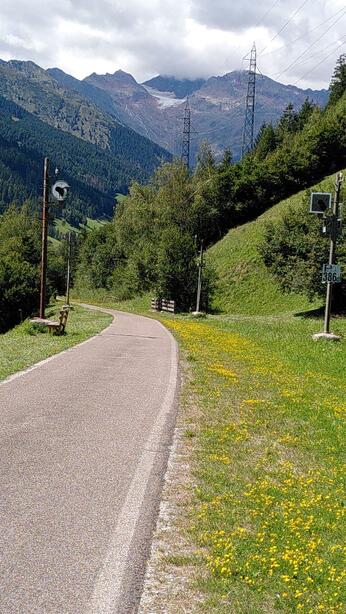
From here: let loose and roll on, on the track bed of the old train
line over the Brenner Pass. Easy. Pedalling started around Sterzing. Lots of cyclists on the
way (including families), but there was not a minute without the constant noise of fossile-fuelled passively moved obese cars on the motorway, always within hearing range, often within eye-sight.
The bicycle route is
all paved and usually guarded with railings, and there are frequent
signposts. However, be careful and watch out for the red horizontal stripes on the pavement: They are marking serious bumps which can be dangerous at the good speed you may gain.
Unfortunately the route avoids habitated placed, so for food you have
to actively leave it as you certainly do not want to pick off the apples
or corn ears along the way: Almost all of them are treated with pesticides.
For the night my partner wanted to find a nice, eco-friendly hotel – and made the mistake to trust in Google. So we left the bike route at Niedervintl/Vandoies di Sotto in the Puster Valley for Terenten/Terento.
600 meters difference in altitude divided upon only six kilometres, a proper work-out for the evening.
Taking the twisting road uphill was not nice even though most car drivers behaved
properly. We met the public bus no. 421 from Vintl/Vandoies station via Terenten/Terento to Bruneck/Brunico operated at an interval of half an hour (two hours on Sundays) during the day: It was nearly empty in both
directions.
Arriving at the hotel it felt like becoming the talk of the town, other guests were looking at us in disbelief: Up here without an engine? When you see this nice village depending on car-driven
tourism the necessary change seems impossible. Depressing.
Puster Valley: Terenten/Terento–Cortina d'Ampezzo by bike
After
a quiet night with a beautifully starry sky we took the nicer road
down from Terenten to Kiens. Here we met a handful e-bikers on their way uphill
before we set out on our third leg to Cortina d'Ampezzo. This part of the route through
the Puster Valley is hilly (approximately one kilometre difference in altitude) and passes
through towns and villages.
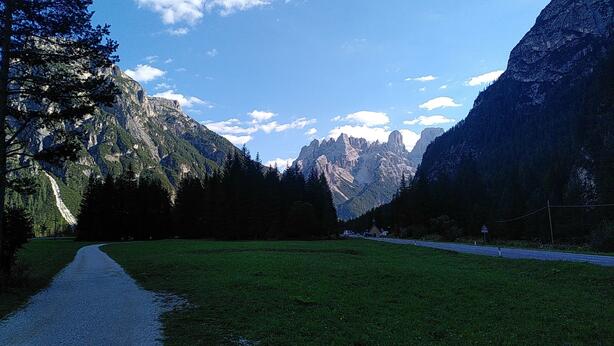
Most of the route is separated from motorised
traffic but only partially paved. While the gravel parts after
Bruneck/Brunico and along Lake Olang would be doable on a Dutch bike, the entire
way from Toblach to Cortina with its breathtaking
views on the UNESCO World Heritage of the Dolomites is a nuisance:
gravel, gravel, deep gravel while the motorised traffic runs smoothly on the new-paved road
within hearing range.
Interestingly, this leg of the route was the only part where oncoming cyclists wouldn't nod (or say) a greeting, not even return our greeting. The vast majority of them used e-bikes, probably car drivers no longer used to this comradely tradition of the hills.
On the pass at the border between South Tyrol
and Belluno we decided to continue on the Strada Statale downhill
as we wanted to reach Cortina before sunset: Apart from the constant
danger of being steamrolled this road lives up to the standard other
Italian long-distance bicycle routes definitely have.
Finally traffic
congestion into Cortina and no way around for cyclists.
Cadore Valley, Piave river and the home of Prosecco: Cortina d'Ampezzo–Conegliano by bike
The fourth leg of the tour
started nicely downhill on a paved separated bikeroute out of
Cortina. At Località Socol the route u-turns to the left into the
gravel nuisance of a hiking trail.
Only after leaving the municipality of Cortina d'Ampezzo the route changes to a bicycle route worth
the name.
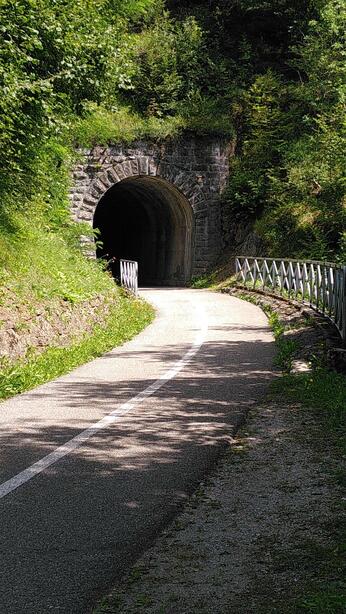
The fun starts on the
former railway line to St. Vito di Cadore, and continues along the Cadore
Valley. Comfortable cycling with great views. The only point without a
route sign comes when you have to leave the former
rail line for the approximately one kilometre difference in altitude downhill to the
bottom of the valley.
This is where you start sharing the road with cars,
but no worries: The neverending stream of passive mobilists is now using
a new motorway (of which you don't hear much noise), and the old
Strada Statale di Alemagna 51, nicely paved, is only for you and your
downhill fun, occasionally shared with you by a local car. The contrary
wind helped to slow down downhill (and the oncoming pedalists uphill).
Hopefully the road will continue to be maintained for cyclists.
Unfortunately
the fun stops when reaching the lowlands.
On the remaining route to Prosecco
land signs have been put up less frequently and only on short
stretches active mobility is separated from passive. The landscape
itself is interesting: the scarse flat shaped by the river Piave,
through industrial zones, along lakes. But don't be mistaken: it's
hilly, with only short flat stretches. Our day ended with
a gorgeous, partially organic dinner in Conegliano.
Through the Veneto: Conegliano–Venice by bike
The final leg of the München–Venezia bikeroute is flat, dry and hot (in August). The usual Veneto
bicycle route mix: leisurely alleys in the shade along the river, here and
there separated communal bikelanes of varying quality, shared traffic
on not too highly frequented roads. The route is marked but often with
small signs easy to be missed.
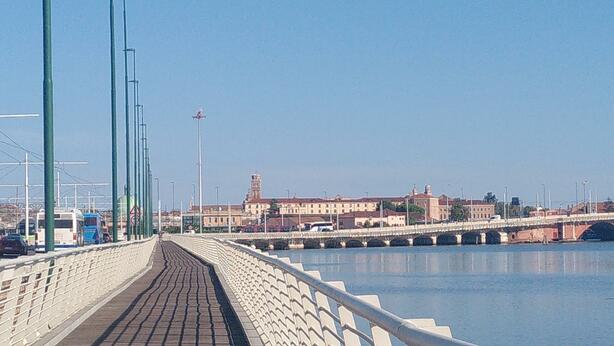
We did not follow the route strictly but
cut off here and there on local bikeroutes. Arriving in Venice by bike is a breathtaking experience: The railway and road bridge Ponte della Libertà ("Freedom Bridge") connecting Mestre on the mainland shore with the city of Venice itself has a dedicated bicycle lane, and you see Venezia St. Lucia approaching in front of you.
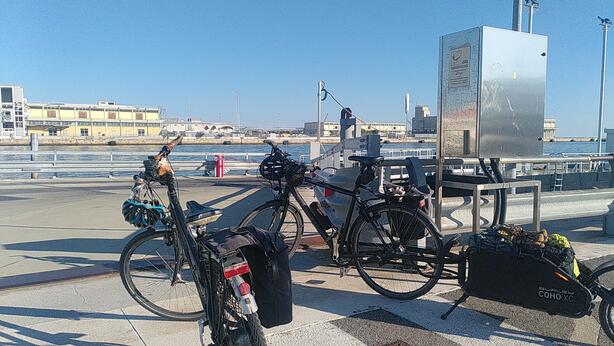
Bicycles in the waterborne city itself are naturally a nuisance, so we decided to stay on the Lido. Unfortunately there are no signs guiding cyclists from Piazzale Roma to the car ferry on the artificial island of Tronchetto. The ferry ride is an inexpensive pleasure – watch the city passing by from Giudecca Channel.
We did not take the bike back to Munich. Instead reliable
Austrian Railways ÖBB gave us and the bikes a lift (to be safe we had bought the tickets and reservations well in advance).
Accommodation on the route
The route's official webpage has a directory of bicycle-friendly accommodations, but since you cannot simply search for a place its use is limited. More, (sometime the same) places can be found on the reliable
Bett&Bike site run by Germany's bicycle association, the ADFC.
Unfortunately none of these directories allows to filter for environment- and climate-relevant measures like organic breakfast, use of renewable energies or environment-friendly cleaning agents.
These efforts towards sustainable tourism are taken into account by the EcoBNB platform.
Most other cyclists we met on the route had a tent with them, certainly the cheapest, but also the most uncomfortable way to spend the nights. We preferred to carry a minimum of luggage, and decided on a budget between 100 and 200 EUR for the night. Unfortunately this budget was too tight for the places I found where you probably could have a fully organic breakfast.
For the first and last stop, Innsbruck and Venice we booked accommodation upfront, but being unfamiliar with the route we decided on last-minute booking directly from the hotels.
The first night we spent at
Hostel Marmota in Innsbruck. It has a spacious bicycle storage room in the basement which is locked during the night. Arriving late was no issue; even though the reception did not answer the phone. The bar did not offer any organic refreshments, but there was one type of organic tea and organic oat drink at the breakfast buffet. Clean, basic, no-frills room.
For the second night in the Puster valley my partner learned a lesson: Do not rely on Google Maps (personally I don't use Google services unless forced to): Even a few kilometers can be very long when they turn out to be uphill after a day on the bike. Our last minute booking call
to Naturhotel Edelweiß in Terenten/Terento
resulted in a very friendly price for a spacious, very nice, wood-furnished room including four-course dinner (for guests only).
The kitchen at this family-run hotel uses local ingredients, but isn't suitable for vegetarians. Also here the only organic items on the breakfast buffet were one type of tea and a plant-based drink (soy in this case). There's no storage room for bikes, but we were allowed to park directly in front of the hotel and turned out to be an attraction for car-dependent hotel guests.
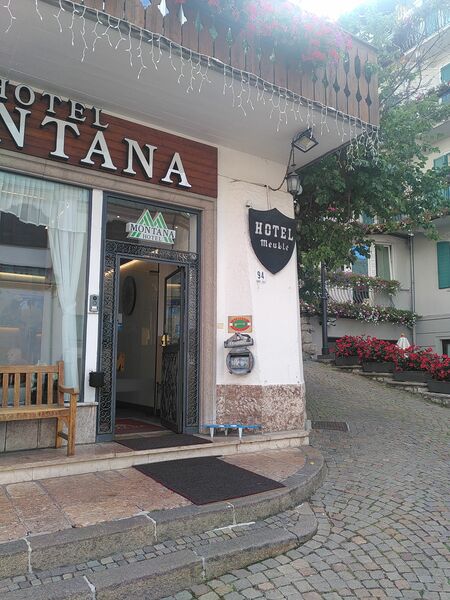
Famous for hosting the winter olympics of 1956 the 2022 version of Cortina d'Ampezzo in the Dolomites turned out to be a single expensive (though still quite elegant) pedestrian street in the middle of a car jam which even us on our bikes forced into a stop-and-go. The most expensive night of our tour we spent in
a basic room with plush furniture at Hotel Montana with a very nice view from the balcony and the air of past grandezza. In addition to the one variety of organic tea and organic soy drink (by now experienced as a sort of minimal standard) the breakfast buffet offered one variety of organic blueberry jam!
The hotel was listed as bike-friendly, and indeed, we could store the bikes in a crammed storage room dedicated to the purpose.
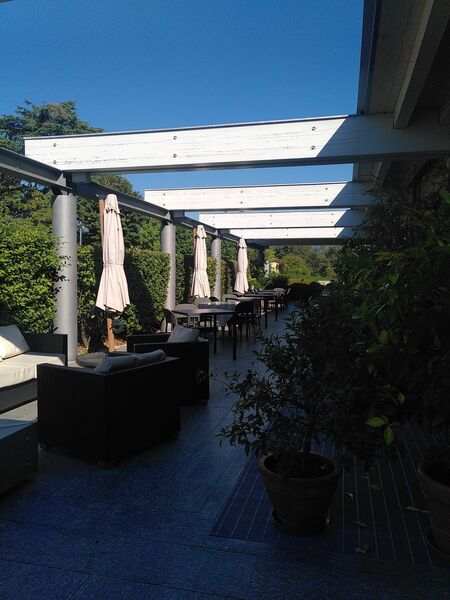
The last night on the way to Venice we spent in Conegliano, at
Relais Le Betulle which we found at at EcoBNB. Their hotel restaurant, Enrica Miron, serves organic meat and eggs, and we were very satisfied with our carte blanche
menu of the day. The breakfast buffet however did not offer more organic items than we by now found usual. There's no dedicated parking space for bikes; we were allowed to take the bikes on the (spacious) room (which had sufficient space on the balcony), but decided to use a car parking lot.
To find a bicycle-friendly accommodation at the final destination, Venice, is not so easy given the aquatic nature of the city. Riding a bike is possible on the Lido, and from a previous bike tour through the Veneto (via Chioggia) we knew that the friendly, family-run
Villa Casanova would allow us to park the bikes in its backyard. From that visit we also knew not to expect any organic items on the breakfast buffet (not even tea and milk), despite the fact that the hotel advertises partially organic breakfast. But the rooms are pleasant and the price is friendly compared with Venice standard.
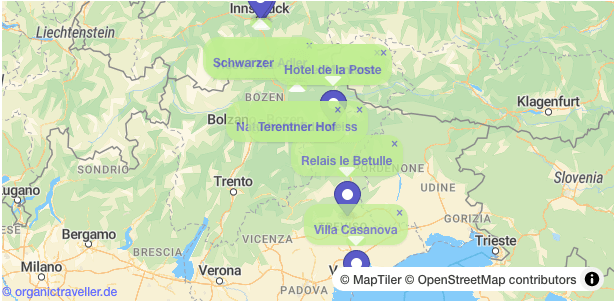
- Hostel Marmota, Tummelplatzweg 2, Innsbruck
- Naturhotel Edelweiss, Unterdorfstr. 6, Terenten/Terento
- Hotel Montana, Corso Italia 94
, Cortina d'Ampezzo
- Relais le Betulle, Via Costa Alta, 56, Conegliano
- Villa Casanova, Via Orso Partecipazio, 9, Lido di Venezia
More to try
For the following hotels I found sufficient evidence for use of organic produce in the kitchen and/or a significant part of organic food and drinks at the breakfast buffet, but I cannot give an eyewitness account.
2022-10-23 13:00:00
[The_Conscious_Traveller, MuenchenVenezia, Germany, Austria, Italy, Munich, Innsbruck, Terenten, Terento, Bruneck, Brunico, Cortina, Alps, Achensee, Pustertal, Puster_Valley, Dolomites, South_Tyrol, Alto_Adige, Suedtirol, Belluno, eco, trains, bikeroutes]
Link

Tuesday, 28 June 2022
Burger restaurants have been trending for years, and there's still no end in sight. Most of them advertise with buzzwords like hand-made, home-made, regional and vegan, and often the quality is ways better than in the standardized mass production of American chains. But to tell greenwashing from honest interest in healthier and sustainable food the patties are key – are they made from organic meat or vegetables?
The organic burger pioneer in Munich was Cosmo-Grill opposite the Bayrische Staatsoper opera house. Tucked away in the the basement of a backyard you entered a Startrek like spaceship. Unfortunately quality and the percentage of organic ingredients diminished with the years, and the place disappeared in 2019.
In 2022 the second oldest organic burger place is Holy Burger in Haidhausen disappeared which successfully took over a location with a long history of serving organic lunch near Bordeauxplatz. I hope its sucessor won't break with the tradition of serving organic food at this address.
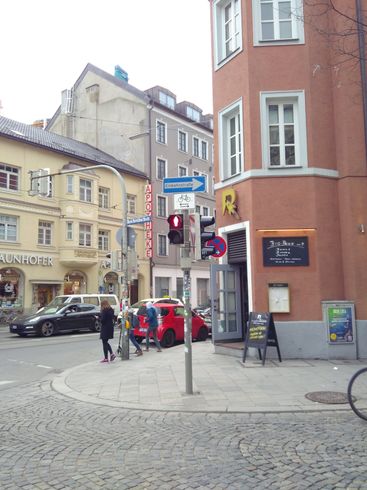
The Holy Burger founders separated around 2018, and the Neuhausen Holy Burger branch changed its name to Goldene Rakete. The "golden rocket" started with three branches, with the flagship decorated with film posters in 70-ies style in Glockenbachviertel: Before corona this place was crowded and almost painfully noisy even on weekday evenings – don't come here if you actually want to converse with friends. The place does not only serve burgers (where it still sticks more or less to the Holy Burger menu), but also bowls, and salads. All meat, the seitan and chickpeas patties as well as the milk for the coffee drinks are organic. Unsurprisingly they also offer fashionable home-made lemonades (not organic). If you are in the mood for wine, gin and tonics you have organic options which are clearly marked "bio" on the menu. In addition the Aqua Monaco soft drinks and the Mondino vermouth are organic, too.
On weekends the Glockenbach branch also offers breakfast.
Closed
2022-06-28 18:30:00
[Munich, Haidhausen, organic, lunch, dinner, restaurant, vegan, vegetarian, burgers, fastfood]
Link

Saturday, 18 September 2021
The idea was simple: Instead of flying – why not travelling climate-friendly? Most certainly this would take some time, but travelling Oslo–Berlin–Paris took time for the famous painters, writers and artists more than a hundred years ago, too.
Upfront research showed that it would have been possible to reach Trondheim within a little more than two nights and a day during the summer 2021, but we were restricted to travel in the first half of September by the date of a family festivity, limited days off from work and the end of the Bavarian school holidays. With only 10 minutes connecting time in Hamburg and, in case of a miss, the next possible connection one week later due to change of timetables on the Swedish part, we gave up on the plan of the fastest possible route. Instead two additional nights, one in Hamburg, and one in Copenhagen, would not only give us a little leisure to re-visit these cities, it would also increase the amount of money to spend: If you decide to travel Europe by train and do not have all the time of a university break a reasonably priced Interrail ticket simply won't suffice.
Finally the travel itinerary came up to
Altogether four nights and about three and a half days involving six train companies – most of them not co-operating. Had we had the time and money for a return trip it would even have been possible to take bicycles on the tour (at least to the Norwegian border).
Amidst the covid-19 pandemic a new privately held German train company took the courage to re-establish over-night travel by train on the North-South line through Germany, one part of the train departing from Salzburg, another from Konstanz by the lake Bodensee to be united on their way to the island of Sylt via (among others) Munich and Hamburg. The train is operated two times per week and tickets can be booked online only. The company informed by e-mail that the departure of the train wouldn't be visibly announced at the train station, but sent time, platform and car location for all stations on the route.
With this information at hand I didn't get nervous when the display at platform 6 in Munich Ostbahnhof announced that all trains would depart from platform 11 or 12 (presumably due to the strike of the Deutsche Bahn train drivers in the summer of 2021). Some fellow passengers found out that this also applied to the Alpen-Sylt-Express, and the entire crowd moved over.
What didn't show up in time was the train by the time of arrival and not even by the time of departure, and as announced, there simply was no information. A helpful staff member of the Austrian train company ÖBB reassured us that the train would arrive here, and finally it appeared on the platform display and, by about half an hour delayed, arrived.
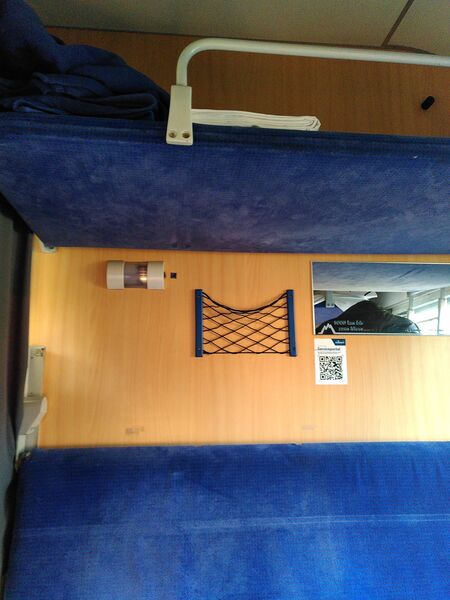
From now on everything went smooth (at least until we reached the Norwegian border). Due to the pandemic no strangers were booked into the former Deutsche Bahn couchette compartment which came at a price of 300 EUR for the two of us. The interior as well as the common wash and toilet facilities were clean, though a little worn. The almost doubly priced (or, in luxury class even more expensive) sleeper (with private room) is of French origin, and there's a very competitively priced seat car (starting at around 70 EUR).
On the train it would have been possible to order a pair of organic soft pretzls, organic tomato soup and organic porridge for dinner and breakfast, though no organic drinks.
Clean sheets were provided for all six sleeping places, and despite being a German train the proper way of sleeping was the Southern way wrapped into the sheet and covered with a blanket. Needless to add that in the couchette car you are expected to make your bed yourself. Complimentary drinking water to brush your teeth was not provided.
Danske Statsbanen (DSB) and Deutsche Bahn (DB) co-operatively run the city connection between Hamburg and Copenhagen via the Storebelt bridge, so buying tickets more or less spontaneously and without providing personal data, at a German or Danish train station usually shouldn't be an issue. The direct IC train runs four times a day to and fro and keeps waiting at the platform in Hamburg central station between arrival and departure. Unfortunately you aren't allowed on board more than fifteen minutes before departure – the train will be closed while the staff is having their break.
There are more connections where you have to change trains, but with almost all of them the journey takes around five hours.
The direct Intercity train is comfortable and – just as the night trains – has capacity for bicycles. Ticket prices vary, depending on whether you have a Bahncard discount card, as well as on how long in advance and where you buy it.
Effectively an urban train line over the Öresund bridge tickets for the Öresundtåg regional train can be bought from the ticket machines at København H – anonymously as long as you see away from the card payment which is the most comfortable payment method if your stay in Denmark isn't long enough to use Danish cash.
Since we travelled during the covid-19 pandemic passports had to be provided in the train which stopped but was closed during the border control.
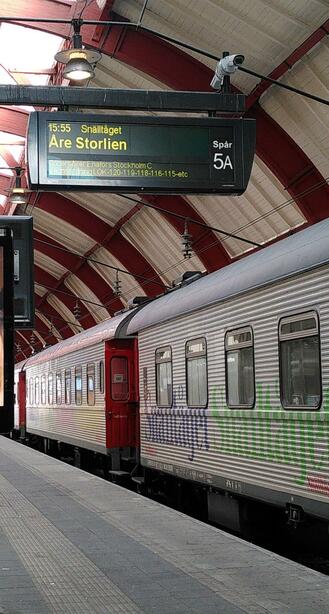
Malmö–Åre/Storlien on the Snälltåget night train
As far as I know night trains between Stockholm and the Swedish-Norwegian border at Storlien have been running for ages, and quite recently the privately held Snälltåget has extended its network to Berlin (via Copenhagen and Hamburg).
During the summer we could have travelled Munich–Berlin with Deutsche Bahn, with four hours the fastest train connection within Germany, and taken the Snälltåget from there, but as the Swedish company changed to their autumn timetable this connection did not work out.
The ticket for two in a private couchette came at 4000 SEK (about 400 EUR) and had to be booked on-line. Due to covid-19 restrictions the remaining four beds weren't filled up, but we were given all six complementary packs of drinking water. The choice at the restaurant car dubbed "Krogen" was limited due to the pandemic, and did not include any single organic item.
Washing facilities in the couchette car are limited to the common toilet.
The beds are a little wider than on the Alpen-Sylt-Express which might have been the reason for that my sleep was deeper and less disturbed during that night. On this train we were given duvet covers.
The train is provided at Malmö C in good time before departure, so we were able to board almost an hour before.
By the way: The train company's name, Snälltåget, is a play on words. The Swedish word "snäll" means "nice" and is a false friend with the German word "schnell" meaning "fast". Before IC and ICE trains took over the city connections in Germany, the then faster trains were referred to as "Schnellzüge", "fast trains".
Åre/Storlien–Trondheim: The last miles
What should have been a 1.5 hours train ride with the Meråkerbanen regional train
from the Snälltåget's final destination Storlien to Trondheim, turned out to be a show stopper for climate-friendly travel as well as a tedious money sink.
When planning the journey in June 2021, the timetables of Meråkerbanen were still on-line, although we expected a rail replacement bus service due to the ongoing electrification work on the route (just like on our last train journey from Stockholm to Storlien in 2017). What we did not expect was that there was no public transport service at all!
Locals told us that the connection has not been operated for the entire covid-19 pandemic, mainly because the Norwegian and the Swedish side wouldn't agree on the test and vaccine control procedure at the border.
So we had to hire a cab from one of the taxi companies in Åre: Taxi Åre did not have any cars left, but Topptaxi was willing to drive us from the train station of Åre over the border to the nearest Norwegian village, Meråker, at the hefty price tag of 2100 SEK. Due to an initial misunderstanding on behalf of the taxi operator we ended up paying only 1700 SEK for the 1.5 hours ride which would have been the price from Åre to the border. Given the fact that Storlien–Meråker would have been much shorter, this was probably a fair deal for both parties.
Since it was raining (the expected weather) we asked the taxi driver to drop us in front of the Coop Xtra hypermarket in Meråker where we could wait inside the "cafe" corner for the bus to Trondheim. A little more than an hour later we were heading over to the bus stop at Meraker school from where the bus no. 670 would take us to Trondheim. (Mind you that this 1.75 hours public bus service does not run on weekends.)
2021-09-18 16:30:01
[The_Conscious_Traveller, Germany, Denmark, Sweden, Norway, Salzburg, Munich, Konstanz, Hamburg, Berlin, Copenhagen, Malmo, Stockholm, Storlien, Aare, Trondheim, eco, nighttrains, trains]
Link

















